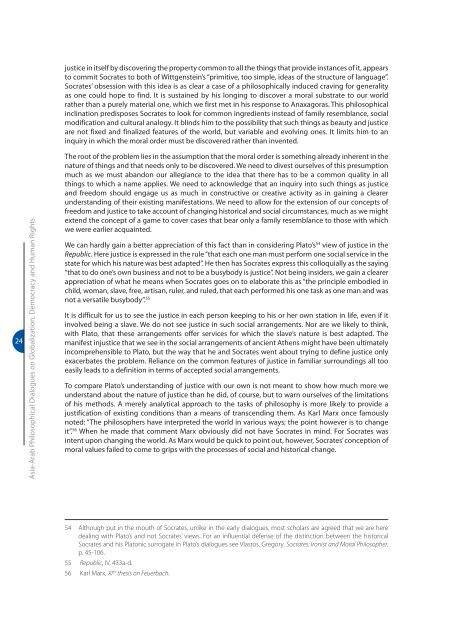Asian-Arab philosophical dialogues on globalization, democracy ...
Asian-Arab philosophical dialogues on globalization, democracy ...
Asian-Arab philosophical dialogues on globalization, democracy ...
Create successful ePaper yourself
Turn your PDF publications into a flip-book with our unique Google optimized e-Paper software.
24<br />
Asia-<str<strong>on</strong>g>Arab</str<strong>on</strong>g> Philosophical Dialogues <strong>on</strong> Globalizati<strong>on</strong>, Democracy and Human Rights<br />
justice in itself by discovering the property comm<strong>on</strong> to all the things that provide instances of it, appears<br />
to commit Socrates to both of Wittgenstein’s “primitive, too simple, ideas of the structure of language”.<br />
Socrates’ obsessi<strong>on</strong> with this idea is as clear a case of a <str<strong>on</strong>g>philosophical</str<strong>on</strong>g>ly induced craving for generality<br />
as <strong>on</strong>e could hope to find. It is sustained by his l<strong>on</strong>ging to discover a moral substrate to our world<br />
rather than a purely material <strong>on</strong>e, which we first met in his resp<strong>on</strong>se to Anaxagoras. This <str<strong>on</strong>g>philosophical</str<strong>on</strong>g><br />
inclinati<strong>on</strong> predisposes Socrates to look for comm<strong>on</strong> ingredients instead of family resemblance, social<br />
modificati<strong>on</strong> and cultural analogy. It blinds him to the possibility that such things as beauty and justice<br />
are not fixed and finalized features of the world, but variable and evolving <strong>on</strong>es. It limits him to an<br />
inquiry in which the moral order must be discovered rather than invented.<br />
The root of the problem lies in the assumpti<strong>on</strong> that the moral order is something already inherent in the<br />
nature of things and that needs <strong>on</strong>ly to be discovered. We need to divest ourselves of this presumpti<strong>on</strong><br />
much as we must aband<strong>on</strong> our allegiance to the idea that there has to be a comm<strong>on</strong> quality in all<br />
things to which a name applies. We need to acknowledge that an inquiry into such things as justice<br />
and freedom should engage us as much in c<strong>on</strong>structive or creative activity as in gaining a clearer<br />
understanding of their existing manifestati<strong>on</strong>s. We need to allow for the extensi<strong>on</strong> of our c<strong>on</strong>cepts of<br />
freedom and justice to take account of changing historical and social circumstances, much as we might<br />
extend the c<strong>on</strong>cept of a game to cover cases that bear <strong>on</strong>ly a family resemblance to those with which<br />
we were earlier acquainted.<br />
We can hardly gain a better appreciati<strong>on</strong> of this fact than in c<strong>on</strong>sidering Plato’s 54 view of justice in the<br />
Republic. Here justice is expressed in the rule “that each <strong>on</strong>e man must perform <strong>on</strong>e social service in the<br />
state for which his nature was best adapted”. He then has Socrates express this colloquially as the saying<br />
“that to do <strong>on</strong>e’s own business and not to be a busybody is justice”. Not being insiders, we gain a clearer<br />
appreciati<strong>on</strong> of what he means when Socrates goes <strong>on</strong> to elaborate this as “the principle embodied in<br />
child, woman, slave, free, artisan, ruler, and ruled, that each performed his <strong>on</strong>e task as <strong>on</strong>e man and was<br />
not a versatile busybody”. 55<br />
It is difficult for us to see the justice in each pers<strong>on</strong> keeping to his or her own stati<strong>on</strong> in life, even if it<br />
involved being a slave. We do not see justice in such social arrangements. Nor are we likely to think,<br />
with Plato, that these arrangements offer services for which the slave’s nature is best adapted. The<br />
manifest injustice that we see in the social arrangements of ancient Athens might have been ultimately<br />
incomprehensible to Plato, but the way that he and Socrates went about trying to define justice <strong>on</strong>ly<br />
exacerbates the problem. Reliance <strong>on</strong> the comm<strong>on</strong> features of justice in familiar surroundings all too<br />
easily leads to a definiti<strong>on</strong> in terms of accepted social arrangements.<br />
To compare Plato’s understanding of justice with our own is not meant to show how much more we<br />
understand about the nature of justice than he did, of course, but to warn ourselves of the limitati<strong>on</strong>s<br />
of his methods. A merely analytical approach to the tasks of philosophy is more likely to provide a<br />
justificati<strong>on</strong> of existing c<strong>on</strong>diti<strong>on</strong>s than a means of transcending them. As Karl Marx <strong>on</strong>ce famously<br />
noted: “The philosophers have interpreted the world in various ways; the point however is to change<br />
it”. 56 When he made that comment Marx obviously did not have Socrates in mind. For Socrates was<br />
intent up<strong>on</strong> changing the world. As Marx would be quick to point out, however, Socrates’ c<strong>on</strong>cepti<strong>on</strong> of<br />
moral values failed to come to grips with the processes of social and historical change.<br />
54 Although put in the mouth of Socrates, unlike in the early <str<strong>on</strong>g>dialogues</str<strong>on</strong>g>, most scholars are agreed that we are here<br />
dealing with Plato’s and not Socrates’ views. For an influential defense of the distincti<strong>on</strong> between the historical<br />
Socrates and his Plat<strong>on</strong>ic surrogate in Plato’s <str<strong>on</strong>g>dialogues</str<strong>on</strong>g> see Vlastos, Gregory. Socrates: Ir<strong>on</strong>ist and Moral Philosopher,<br />
p. 45-106.<br />
55 Republic, IV, 433a-d.<br />
56 Karl Marx, XI th thesis <strong>on</strong> Feuerbach.

















